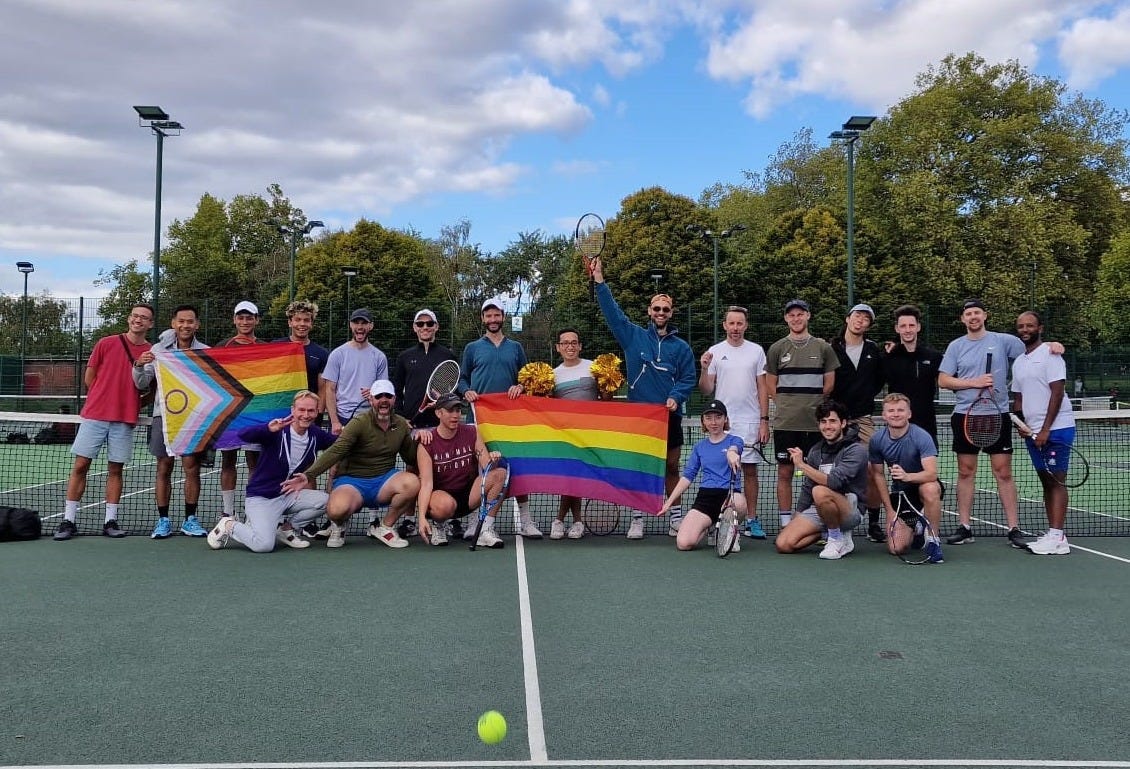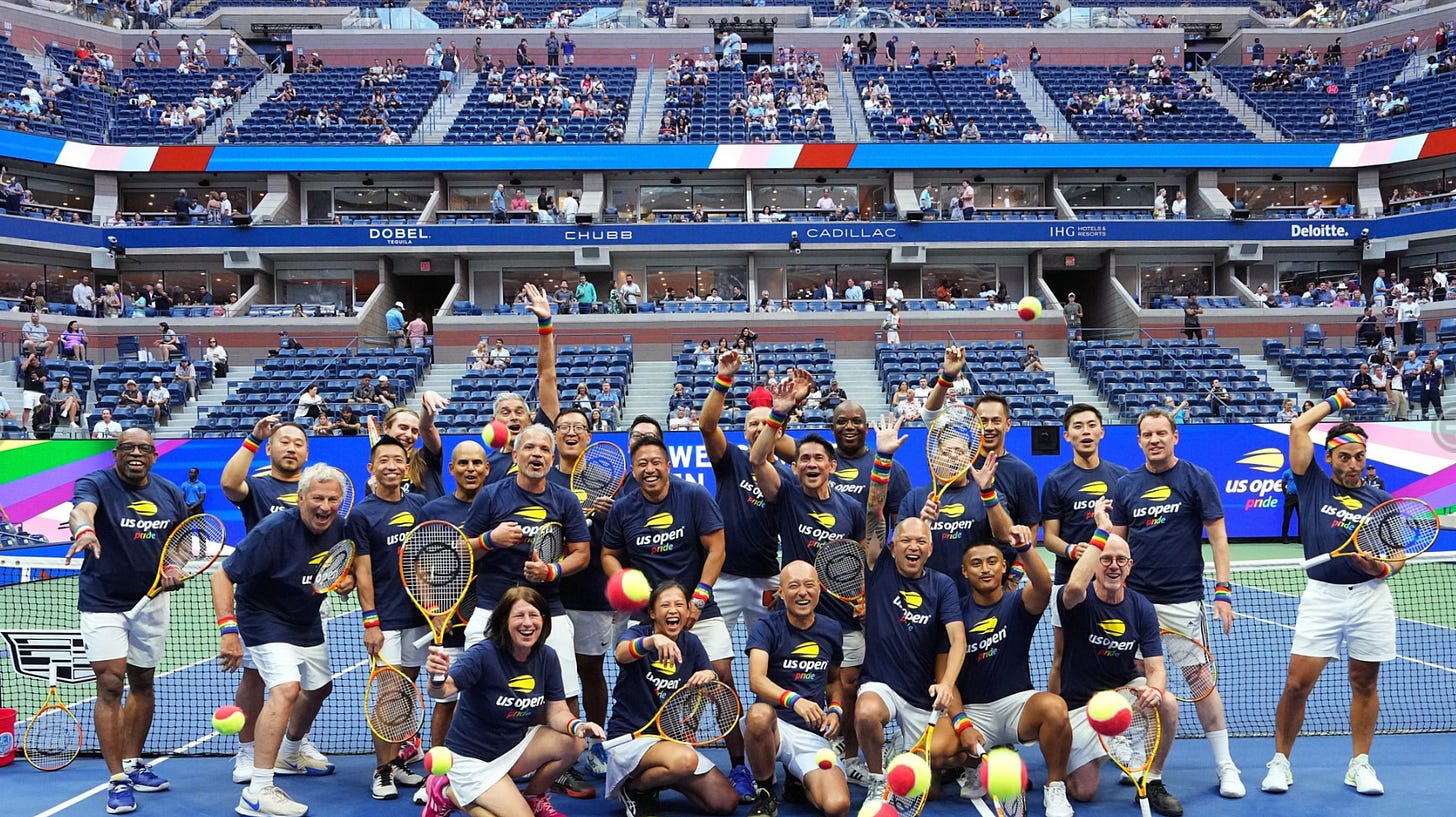Pride Month Special: LGBT Ballers
The gays can not only organise, they play good tennis + they love Eastbourne

For the first time in recent memory, the middle Saturday of Wimbledon will take place during the LGBT Pride Parade, leaving some of the current crop of LGBT professional players and SW19 regulars, including Martina Navratilova, Billie Jean King, Daria Kasatkina, Rennae Stubbs and Geet Minnen, torn: watch the greats have a go on grass in SW19 or party hearty about seven miles away along Oxford Street.
Although Open-Era LGBT players have the freedom to choose the latter, those pre-70s and 80s, including those whose careers ended in disgrace, had no choice: play at Wimby and never dream of being “Open”. May ‘Toupie’ Lowther, a woman whose story could fill the pages of a novel, was among the earliest group of gay players who was a regular participant at Edgbaston, Queen’s, the German Ladies Championships (held at the prestigious Bad Homburg Tennis Club) from 1896–1901, and Wimbledon.
As far as the ATP records book indicate, however, only two openly gay men have played at an elite level, both before World War II. The first, Gottfried (Baron) von Cramm, a German aristocrat noted for his gentlemanly conduct and fair play, won the 1934 and 1936 French Open before the German government arrested him in 1938 for having a gay affair with a Jewish actor. He was jailed for six months before marrying a heiress, endured a ban from Wimbledon after the incident, was conscripted by the German Army and unwillingly fought in World War II. The second, Bill Tilden, an American, won 14 Major singles titles, including 10 Grand Slams, before he was arrested on Sunset Boulevard by the Beverly Hills police for having sex with an underage male in November 1946. Tilden was sentenced to a year in prison, served seven months and received parole conditions so strict that they virtually erased all his income. After having another encounter with a 16-year-old hitchhiker, he was arrested again in January 1949 and was incarcerated for another 10 months. In both instances, Tilden believed his celebrity, privileged background and friendships with the Los Angeles elites would keep him from both detention and social death. It didn’t. Tilden died alone, broke and likely drunk in LA in 1953 at age 60.

Lastly, one of the most notable at the time and least-mentioned players, was Dr. Renée Richards (formerly Richard Raskind) an American ophthalmologist and former tennis player who competed on the professional circuit in the 1970s — the first openly trans women to fight to the United States Tennis Association (USTA) for a spot in the 1976 U.S. Open. Raskind, a product of New York’s Jewish upper-middle class and Yale University — where he captained the men's tennis team — started dressing as a woman in college and by the 1970s, had considered sex-reassignment surgery, ultimately receiving it in 1975. After that, she started competing as a women, largely in California. Local TV anchor Richard Carlson (the father of Tucker) outed Richards before the beginning of the Open, which had been requiring all female competitors to verify their sex with a Barr chromosome test. Richards refused, and thus was not allowed to compete in the Open, Wimbledon, or the Italian Open in the summer of 1976. She the sued the USTA and took the Barr body test, which came out as ambiguous. But in 1977, a judge ruled the USTA had committed “grossly unfair, discriminatory… violation of her rights.”
But it didn’t seem to matter much. By then, Richards was in his 40s and lost to a much younger Virginia Wade in the first round of the singles competition. But partnered with Betty Ann Stuart, Richards made it all the way to the doubles finals, losing to Martina Navratilova and Betty Stove. After retiring four years later, Richards became one of the first professional spokesperson for transgender people in sports, ultimately opposing her onetime protege, Martina Navratilova, whom Richard coached to two Wimbledon titles.
Yet, as Billie Jean and Martina were embracing their sexuality — after being “outed” by paternity suits — many openly LGBT tennis clubs and associations started forming, especially in England. The following is a round-up of the gays who play. But first, an Eastbourne Grass Check-in, a favourite of the LGBT crowd due to its proximity to Brighton, the gay hub of coastal England.

The Ageon… no, now Lexus Eastbourne Open 2025:
It’s almost a bit of too much grass, like a deliberate English ploy to induce hay fever — or a delirium for Wimbledon: four weeks of grass season. But this year, there was a bit of a switch up. After two weeks for the men and women at the Queen’s Club grass, some of the men departed for Spain for their last green warm-ups, while the women headed off to either Nottingham, Bad Homberg or Eastbourne before they enter the grounds of All-England Lawn Tennis Club for its annual championships, aka Wimbledon. Although the tourney has changed names — and sponsors — no fewer than five, six, seven times (Lexus took over from, Rothesay International, the UK's largest pensions insurance specialist, which took over from Viking the cruise line, which took over from AGEON, etc., etc., one thing is certain: the Brits always want one of their own to kiss the “Rothesay trophy.” Or this year, the Lexus trophy?
Although the LTA officially downgraded the Eastbourne International to a WTA 250 from a WTA 500, yet kept the men at the ATP 250 level, the quality of its tennis on show proved just as high as previous years. Top British players appearing in Sussex included Emma Radacanu, Jodie Burrage, and Brighton local, Sonay Kartal, while reigning Wimbledon champ Barbora Krejcikova was top seeded. But none of the Brits endured and the final tomorrow will consist of two virtually unheard of Challengers from the South Pacific: the Philippines’ Alexandra Eala (WTA No. 74 ) facing Australia’s Maya Joint (WTA No. 51). This comes immediately before an all-American battle on British soil between defending champion Taylor Fritz (ATP No. 5) and Jenson Brooksby (ATP No. 149) — the first time in tournament history, a lucky loser (and openly autistic player) — has reached the final.
The Gays who play… tennis:
The first lesbian and gay tennis groups started to form in American Cities such as Dallas, Los Angeles, San Francisco and Houston as early as 1979. And by the time Martina was dominating the pros, an informal gay and lesbian tennis circuit had formed. By the late 1980s gay tennis organizations were hosting tournaments that drew players from around the U.S. To compete with the 1990 Gay Games in Vancouver, the diverse groups formed the Gay and Lesbian Tennis Alliance in 1991 to oversee more than 80 gay and lesbian clubs around the world and host LGBT tournaments with some of the most decorative trophies and punniest names known to the tennis world. Here are the most active groups:
The United Kingdom:
The North London Lobsters: Based in Finsbury Park, North London, the Lobsters are “all about” top-notch facilities, epic events and forging lifelong friendships over the LGBT shared love for the game. Founded in 2022, the Lobsters have grown from small social doubles to coaching sessions to ongoing ladders and competition among its 400 members.
The Geordie Grandslammers: The North East’s only LGBTQ+ tennis club, the Grandslammers is also one of the country’s newest, having former in 2022. It hosts sessions at the Northumberland Club, as well as a World AIDS Day tournament.
The South London Smashers: Founder Ryan Watson set up the South London Smashers after he found that continuously explaining his identity to new people and clubs had grown tiresome. “The main thing for us was trying to find a space that was safe to play in where anyone could come and just be themselves,” he said. “We’ve opened the door to allow so many new players to come and play with us who have never felt comfortable enough to pick up a racket before.” The Smashers have so far arranged hitting sessions and court time, but bigger things are in the works.
The United States:
Metropolitan Tennis Group (MTG): For over 30 years the MTG has organized and hosted the Liberty Open, a premier tournament on the GLTA World Tour at the Billie Jean King National Tennis Center in Queens, New York. Active since 1987, the MTG also offers leagues, ladders, tournaments and other playing opportunities for all levels from beginners to Open players.
Capital Tennis Association (CTA): Formed in 1994 as a not-for-profit group to coordinate tennis among the adult DC LGBTQ, the Capital Tennis Association has more than 300 active players and members. The org hosts leagues, in-house tournaments and social-and-drill sessions. Every summer the CTA participates in the Atlantic Cup, a quad-city competition between LGBT tennis groups in Boston, NYC, Philadelphia, and DC, with each city taking turns as host.
Gay & Lesbian Tennis Federation (GLTF): In 1981 San Francisco, a group of group of gay softball players decided they would like to play tennis too, and thus — with 12 members — the GLTF hosted theUnited States Gay Open (USGO), one of the oldest, largest and most prestigious gay tennis tournaments in the world. The GLTF now has more than 500 members who play tennis and pickleball tournaments around the bay areas and all across California, including the Cal Cup, the Pac Cup and the West Coast Cup.
Europe:
Smashing Pink (Amsterdam): Founded in 1996 on the back of 1994 Gay Games in New York, Smashing Pink is an official club of the Royal Dutch Lawn Tennis Association (KNLTB). It has about 275 club members covering all the gender and sexual identities, as well as global nationalities, who have happened to have settled in The Netherlands.
Things Rally Relished: Coco Gauff and Aryna Sabelenka’s Make Up Dance
The duo is finally over their French Open tiff about who had the bad luck; not that Coco ever really complained about the wind conditions — or the crowd.
Things Rally Reproved: The Duet Polvere e Gloria featuring Jannik Sinner and Andrea Bocelli
First he is becoming buddy-buddy with the Pope, now he is singing with the blind opera impresario Andrea Bocelli — a Las Vegas staple — to prove his Italian bona fides? Explore a career change should doping accusations rear their ugly heads again? Bad advice from an agent? We just don’t understand the release of the pair’s song Polvere e Gloria (Dust and Glory), and includes Sinner, 23, repeating parts of his winning and losing speeches as Bocelli sings.








